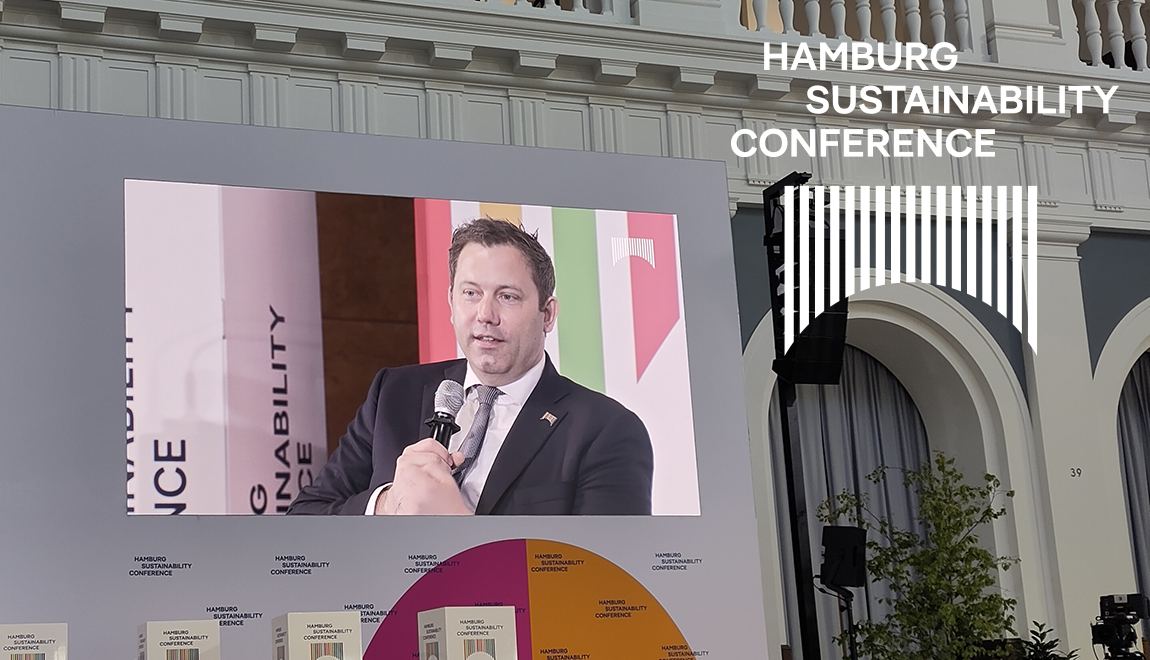HAMBURG SUSTAINABILITY CONFERENCE: PRAGMATISM AND NETWORKS WITH BUSINESS TO FIGHT GLOBAL CRISES
International cooperation is under pressure in the face of crises and political changes – yet at the same time it is more important than ever to mitigate the consequences of conflict, strengthen climate protection, combat poverty and inequality, and secure education and human rights. This was the tenor of the second Hamburg Sustainability Conference. As an important service provider in the field of international cooperation, GFA attended the conference, as it did last year.
The fact that the industry and the market are changing is also reflected in the available budgets. Reforms are necessary, said Germany's Finance Minister Lars Klingbeil in his keynote speech on Tuesday. He was convinced that every euro spent for other countries is relevant for German interests as well. Klingbeil said, Germany would work on strategic partnerships for win-win situations and many countries in the Global South were looking for cooperation beyond the US and China for economic, social and security issues. GFA Managing Director Anja Desai took part in the Business Leaders Forum at the Hamburg Chamber of Commerce in the morning. There, Nils Annen, State Secretary at the Federal Ministry for Economic Cooperation and Development (BMZ), emphasised the importance of cooperation with the private sector not only from Germany. Private sector participants are interested in receiving support for the developing phase of investments and in hedging their risks through guarantees.
Donors, local governments and companies should allow for creation and develop targets together instead of having set instruments for standard purposes, according to the panel discussion. "Working in networks and with local presence is therefore more important than ever for us as a service provider”, Anja Desai said, “confirming our strategy of investing more in regional hubs for being closer to our customers and for more efficiency.”
Anja Desai is also optimistic about the mood at the conference: “This year´s HSC wants to send a clear signal in response to the political upheavals of recent months: We will not be discouraged, but will instead seek pragmatic alternatives, diversification and new networks in the face of smaller budgets and political resistance.”
The conference opened on Monday ‘with a strong call for action, collaboration and rethinking global priorities,’ said GFA's Sustainability Manager Hanna Brüning, who also attended the HSC. From her perspective, the first day of the conference revolved around three core themes: technology, global cooperation and financing. Hanna Brüning describes her most important findings from the first day of the conference as follows:
Technology: A Declaration for Responsible AI: One of the most significant moments of the day was the signing of the Hamburg Declaration on Responsible AI for the SDGs. Initiated by Germany’s Federal Ministry for Economic Cooperation and Development (BMZ) and the United Nations Development Programme (UNDP), this declaration is the world's first agreement dedicated to utilising artificial intelligence for sustainable development. The declaration's ambition is clear: to ensure the fair, sustainable and inclusive use of AI worldwide. However, it was revealed that none of the approximately 40 major institutions developing and controlling AI systems are based in Africa. This underscores the urgent need for greater inclusion and equity in the governance of global technology.
Rethinking Global Cooperation: The Global Perspectives Commission, chaired by Annegret Kramp-Karrenbauer and presenting the report “A Changing World – Germany and the Global South”, issued recommendations for realigning Germany’s partnerships with countries in the Global South. In an era of growing international fragmentation, the Commission called for renewed multilateralism and stronger alliances built around common interests and shared responsibility. Key focus areas include geopolitics, development cooperation, international trade, labour migration, climate policy, and global finance. The figures are sobering: Official development assistance (ODA) has already declined by 7% in 2025and is projected to fall by a further 20% by 2026. There is an increasing need for political leadership and new coalitions.
Financing: Bridging the Gap Between Ambition and Means: How can we promote sustainable development when public resources are dwindling? The discussion on blended finance has brought forward new solutions. The launch of SCALED (Scaling Capital for Sustainable Development), a new joint initiative backed by multiple donor governments, development banks, and private insurers, aims to break down barriers to private investment in sustainability. However, experts have noted that only 10 to 15 economies in the Global South currently attract meaningful interest from large-scale private capital. Many others remain invisible to investors, not due to a lack of potential, but because of perceptions and structural barriers.
Empowering African Entrepreneurs: A session dedicated to business leaders focused on how to mobilise private investment for entrepreneurship in Africa. The message was clear: Africa is open for business. Given that 80% of African enterprises are SMEs, future financing strategies must prioritise young people, women, and technology-driven solutions. Participants emphasised that, in order to unlock this potential, financing tools must be adapted to local realities by offering more flexibility, reducing risk aversion, and reinforcing local innovation ecosystems.
The conference itself ends today, 3rd June, but an accompanying Hamburg Sustainability Week, which runs alongside it, continues until Friday.
To learn further details, go to: www.sustainability-conference.org
On the first photo below: Anja Desai, Managing Directer of GFA and Hanna Brüning, GFA Sustainability Manager







